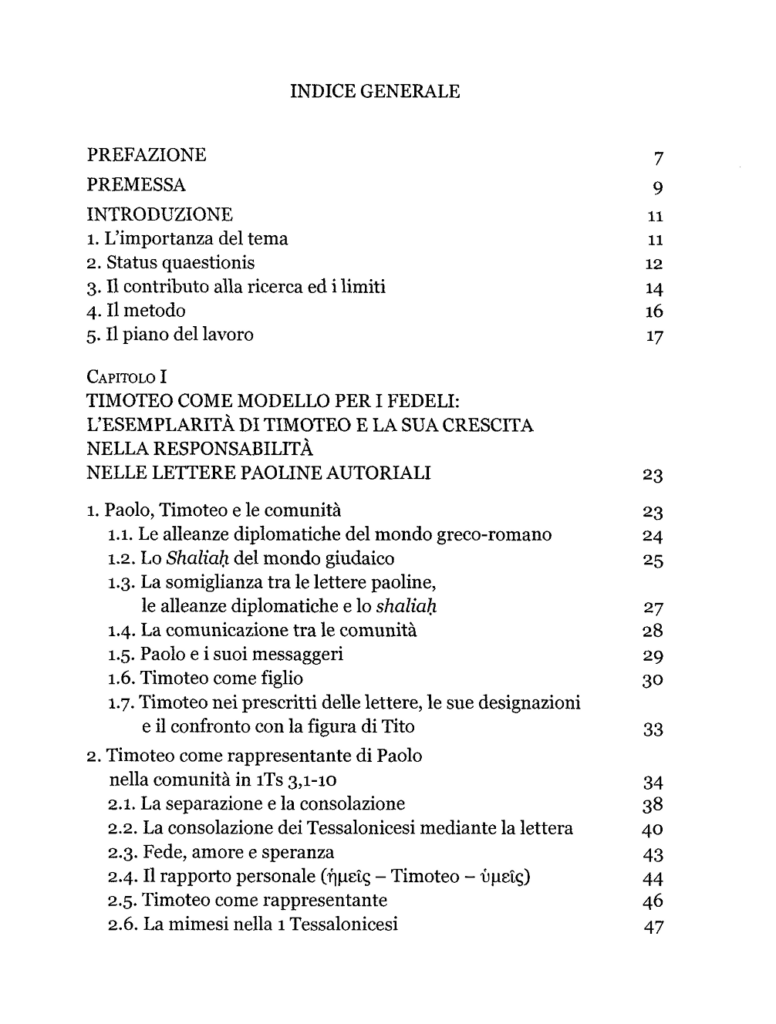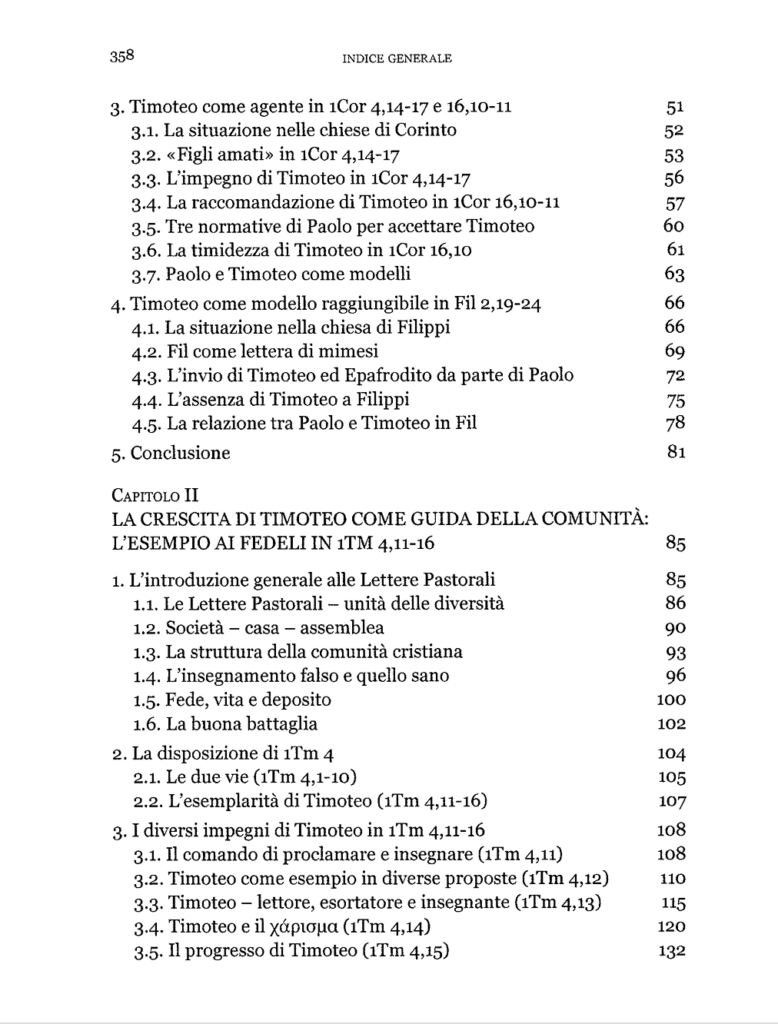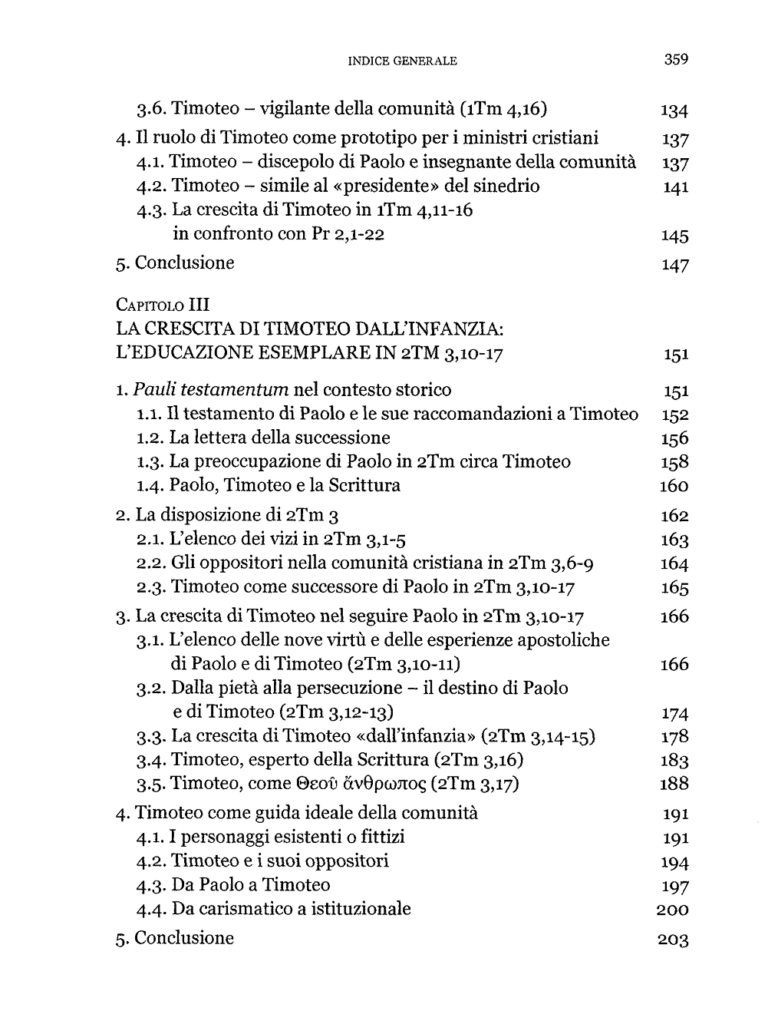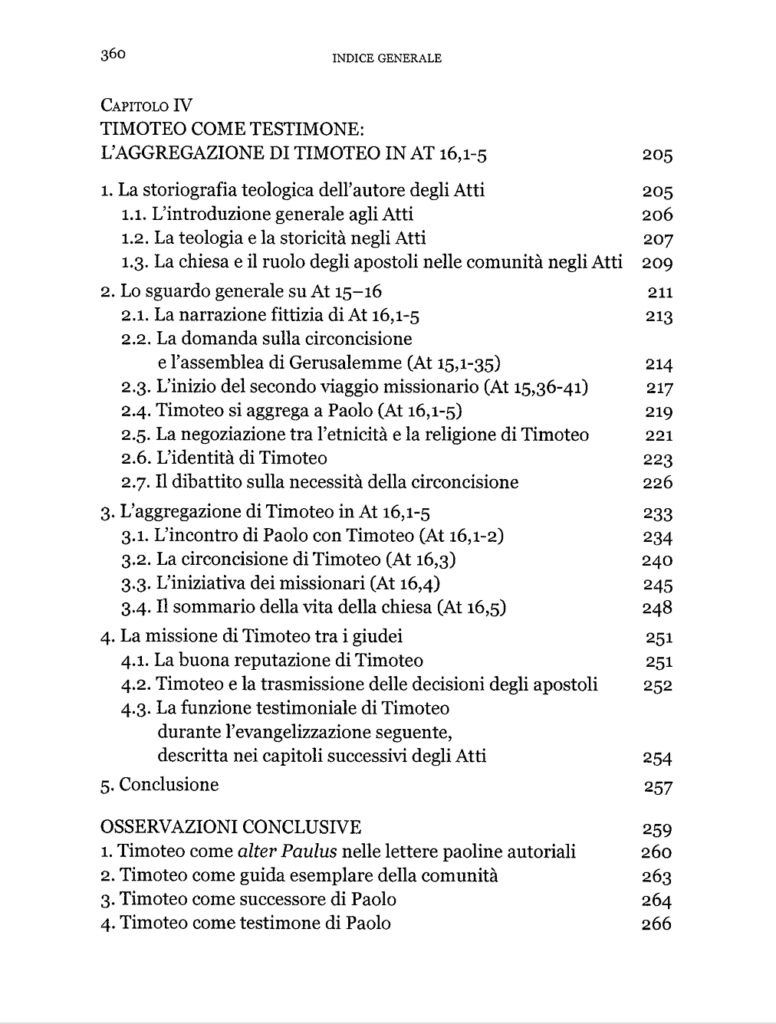
A remarkable-looking contribution that had escaped my notice until now:
L’ubomír Majtán. La crescita nella responsabilità di Timoteo. Storicità ed esemplarità di Timoteo [The growth in Timothy’s responsibility. The historicity and exemplarity of Timothy]. Rome: Angelicum University Press, 2021.
I knew of a few earlier articles produced by Majtán in Slovak and Italian, which had been noted in New Testament Abstracts:
- “Timotej—Pavlov delegát v komunitách: Osoba delegáta v Pavlových listoch vo svelte grécko-rimskej korešpondencie a rabínskej halachickej literatúry” [“Timothy—Paul’s Agent in the Communities: The Status of Agent in the Pauline Epistles in the View of Greco-Roman Diplomatic Correspondence and Rabbinic Halachic Literature”]. Studia Biblica Slovaca (Bratislava) 11.1 (2019): 42–56. [Slovak]
- “Timotej a charizma v 1Tim 4,14 Ratifikácia alebo transfer pri vkladaní rúk starších? [Timothy and Charisma in 1 Tim 4:14: A Recognition or a Transfer through the Laying on of Hands by the Elders?]” Studia Biblica Slovaca (Bratislava) 11.2 (2019): 103–19. [Slovak]
- “Motívy obriezky Timoteja v Sk 16,1–5: Historický, etnický, a náboženský aspekt obriezky Timoteja v Skutkoch apoštolov a teologická interpretácia z pohl’adu spoločenstva prvotnej Cirkvi [Motives of Circumcision of Timothy in Acts 16:1–5: Historical, Ethnical and Religious Aspects of the Circumcision of Timothy in the Acts of the Apostles and the Theological Interpretation from the Perspective of the Early Church Community].” Studia Biblica Slovaca (Bratislava) 13.1 (2021): 74–94. [Slovak]
- “È vero che Timoteo sostituisce Paolo a Tessalonica in 1 Ts 3,1–10? // Ali drži, da Timotej nadomesti Pavla v Tesalonikah v 1 Tes 3,1–10? // Is It True that Timothy Substitutes [for] Paul in Thessalonica in 1 Thess 3,1–10?” Bogoslovni vestnik 81.1 (2021): 47–56. [Italian]
These seem to have been preparatory for Majtán’s monograph, which I presume is a published doctoral thesis. Timothy is significant enough a figure in the New Testament that there have been numerous treatments of him in the scholarly literature, both as standalone essays and in broader treatments of Paul’s coworkers (in addition, of course, to commentary discussion). Here is a sampling of those treatments:
- Franz X. Pölzl, Die Mitarbeiter des Weltapostels Paulus (Regensburg: G. J. Manz, 1911), 136–70.
- William E. Hull, “The Man—Timothy,” RevExp 56 (1959): 355–66.
- Pedro Gutiérrez, La paternité spirituelle selon saint Paul, EBib (Paris: Gabalda, 1968), 225–31 (“Fils, Disciples, Successeurs (Timothée et Tite)”).
- E. E. Ellis, “Paul and His Co-Workers,” NTS 17 (1970–71): 437–52.
- Wolf-Hennig Ollrog, Paulus und seine Mitarbeiter: Untersuchungen zu Theorie und Praxis der paulinischen Mission, WMANT 50 (Neukirchen-Vluyn: Neukirchener, 1979), 20–23.
- Udo Borse, “Timotheus und Titus, Abgesandte Pauli im dienst des Evangeliums,” in Der Diakon: Wiederentdeckung und Erneuerung seines Dienstes, ed. Josef G. Plöger and Hermann J. Weber (Freiburg: Herder, 1980), 27–43 (although his aim is to show that Timothy and Titus were actually the same person, he provides along the way an excellent summary of the biblical data).
- F. F. Bruce, The Pauline Circle (Grand Rapids: Eerdmans, 1985), 29–34.
- John Gillman, “Timothy,” ABD 6:558–60 (1992).
- Margaret M. Mitchell, “New Testament Envoys in the Context of Greco-Roman Diplomatic and Epistolary Conventions: The Example of Timothy and Titus,” JBL 111.4 (1992): 641–62.
- Christopher R. Hutson, “Was Timothy Timid? On the Rhetoric of Fearlessness (1 Corinthians 16:10–11) and Cowardice (2 Timothy 1:7),” BR 42 (1997): 58–73.
- Giancarlo Biguzzi, “L’autore delle Lettere Pastorali e Timoteo,” in Il deposito della fede: Timoteo e Tito, ed. Giuseppe de Virgilio, RivBSup 34 (Bologna: Dehoniane, 1998), 81–112.
- Bruce Malina, Timothy: Paul’s Closest Associate (Collegeville, MN: Liturgical, 2008), though note Mark Batluck, “Paul, Timothy, and Pauline Individualism: A Response to Bruce Malina,” in Paul and His Social Relations, ed. Stanley E. Porter and Christopher D. Land, PSt 7 (Leiden: Brill, 2012), 35-56.
- Yann Redalié, “Timothée, le disciple à l’ombre de Paul,” LumVie 59 (2010): 21–31.
- Hermann von Lips, Timotheus und Titus: Unterwegs für Paulus, 2nd ed., Biblische Gestalten 19 (Leipzig: Evangelische Verlagsanstalt, 2010).
- Bernhard Mutschler, “Silas/Silvanus und Timotheus als Mitarbeiter des Paulus: Eine Spurensuche in der Apostelgeschichte und im 1. Thessalonicherbrief,” Der 1. Thessalonicherbrief und die frühe Völkermission des Paulus, ed. Ulrich Mell and Michael Tilly, WUNT 479 (Tübingen: Mohr Siebeck, 2022), 179–227.
I have not yet obtained Majtán’s monograph, but its 361-page length suggests that anyone seeking to produce a serious treatment of Timothy in the future will need to take account of it. Here is the volume’s summary in English translation (original Italian):
- “Timothy is one of Paul’s most faithful and important collaborators. After being added to the missionary team in Acts 16:1-5, he never ceases to accompany Paul in the important stages of his apostolic work. He is mentioned in later chapters of the Acts of the Apostles as witnessing the entrance of Gentiles into the church. Taking note of the various difficulties in which the Christian communities live, Paul sends him entrusting him with the responsibility of resolving the difficult situation, the problems that arise in the Christian communities or at least to send the Apostle’s recommendations. In the balance of the following years, we can see the growth of his responsibility, so much so that Timothy, day after day, receives authority, prominence and an important role within the communities. Thus, in various moments of his life, Timothy grows in his responsibility and according to the Pastoral Letters he becomes the successor of the Apostle.” [Google Translate]
Following are the contents of the volume. Notice that though the Pastorals are mentioned only briefly in the above summary, two entire chapters consisting of 115 pages discuss Timothy in the context of 1 and 2 Timothy.





